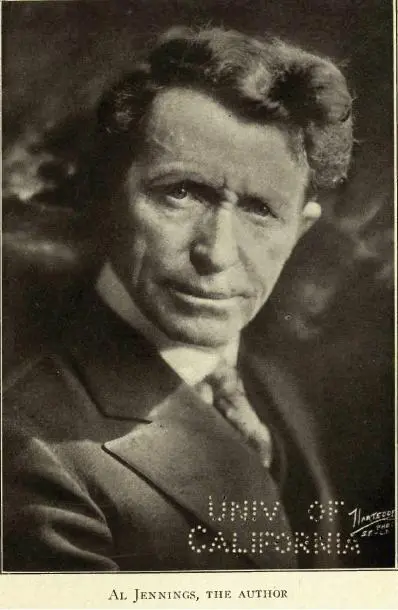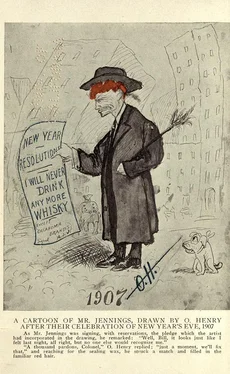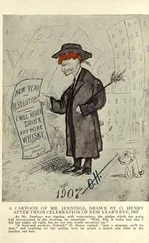Al Jennings - Through the Shadows with O'Henry
Здесь есть возможность читать онлайн «Al Jennings - Through the Shadows with O'Henry» весь текст электронной книги совершенно бесплатно (целиком полную версию без сокращений). В некоторых случаях можно слушать аудио, скачать через торрент в формате fb2 и присутствует краткое содержание. Жанр: Биографии и Мемуары, на английском языке. Описание произведения, (предисловие) а так же отзывы посетителей доступны на портале библиотеки ЛибКат.
- Название:Through the Shadows with O'Henry
- Автор:
- Жанр:
- Год:неизвестен
- ISBN:нет данных
- Рейтинг книги:5 / 5. Голосов: 1
-
Избранное:Добавить в избранное
- Отзывы:
-
Ваша оценка:
- 100
- 1
- 2
- 3
- 4
- 5
Through the Shadows with O'Henry: краткое содержание, описание и аннотация
Предлагаем к чтению аннотацию, описание, краткое содержание или предисловие (зависит от того, что написал сам автор книги «Through the Shadows with O'Henry»). Если вы не нашли необходимую информацию о книге — напишите в комментариях, мы постараемся отыскать её.
Through the Shadows with O'Henry — читать онлайн бесплатно полную книгу (весь текст) целиком
Ниже представлен текст книги, разбитый по страницам. Система сохранения места последней прочитанной страницы, позволяет с удобством читать онлайн бесплатно книгу «Through the Shadows with O'Henry», без необходимости каждый раз заново искать на чём Вы остановились. Поставьте закладку, и сможете в любой момент перейти на страницу, на которой закончили чтение.
Интервал:
Закладка:
"Colonel, you would envy me---" the voice was a low chuckle.
"I have a desk near the window a big desk with pigeon-holes. I have all the books I want. I can read and think without interruption. Now I can do something."
Seldom had Porter alluded to his ambition to write. We sent out some of his stories, but he let us think they were done just for diversion. The new position gave him plenty of opportunity to try out his talents. He spent every spare moment "practicing," as he used to put it.
We talked about literature and its purposes very often now, for I was even freer than Bill. I had been made secretary to Warden Darby. I had even managed to worm myself out of convict clothes. When I went into Darby's office I was brought into contact with all the distinguished visitors of the State and Nation.
"I look pretty shabby," I hinted to Darby. "I ought to be more up to my position." He turned to me.
"Sure," he said; "go over to the State shop and get the best suit of clothes you can order."
He meant the best suit of convict clothes. I picked out a fine piece of serge and ordered as clever a suit as the Governor might have worn. When Darby saw me without the stripes, he gasped.
"Pretty slick," was the only comment he made. I never wore the stripes again.
Nearly every night Porter would come across the street to visit Billy and me. We would talk by the hour, filling him up on the exploits of bandit days, spinning out the yarns in choice outlaw lingo. He listened captive. The stories seemed to suggest ideas to him. He never used anything just as it was told to him.
"You ought to startle the world," he said to me one day.
"How, by shooting it up?"
"No, colonel, but you have a wonderful lot of stories. You can view life from a thousand viewpoints."
I often wondered at Porter's methods. It seemed to me that he overlooked innumerable stories by his aloofness. He did not seem to have the slightest de- sire to ferret out the secrets of the men in the pen. The convict as a subject for his stories did not appeal to him.
I am convinced that he felt himself different from the average criminal. It was not until he returned to the world and suffered from its coldness that his sympathies were broadened and his prejudices mellowed.
One very odd experience revealed this trait in Porter. I used to play in the prison band every Sunday at chapel. One morning a song thrilled out from the the women's loft.
It was the most magnificent contralto voice I have ever heard. It had a purple depth and intensity of feeling in its tones and at times there was a mournful, piercing pathos in it that struck into the soul like a heartbroken wail.
I looked up, trying to trace the voice to its owner. And finally it seemed to me that a tall, proud-looking girl—a Southerner of exceeding beauty was the singer. Her skin was moon white in its purity, she had splendid gray eyes and hair that fell in a golden radiance about her face. I became greatly interested.
"There's a girl in the pen, Bill," I told Porter, "and you want to come to chapel next Sunday and hear her sing."
"Colonel, I fear you jest. I wouldn't go into the chapel to hear the seven choirs of angels let alone a wretched feminine convict!"
Mrs. Mattie Brown was matron of the women's ward. I was sent over on business. I took the chance to satisfy my curiosity.
"Who is the prima donna that sings on Sundays?" I asked.
"Would you like to see her?" the matron said, looking at me with quiet interest. "You might be able to put in a good word for her and maybe get her a padon. She's a good girl." Mrs. Brown was always trying to help the women convicts. Her understanding was as warm as the sun and as deep as the sea.
"It's a terrible thing to get it the way she did," the matron said. ' 'She's in on a charge of murder. She got life for it."
The girl came down. She was very slender and the cheap, calico polka-dot dress was out of tone with her rich beauty. She looked like a young queen, whose rags could not conceal her distinction.
As soon as she stood before me I was embarrassed. I did not like to ask her questions, but for once in my life curiosity obsessed me. I told her so.
"Your singing attracted me," I said. "I listen for it every Sunday."
A bitter shadow went like an ugly blot across her face and the girl looked up, her clear eyes marred by their look of self-abasement.
"Sing? Oh, yes; I can sing," the voice that was like amber honey mocked. "I sang myself into hell. I don't mind telling you. It isn't often that anyone is interested enough to listen. My people haven't come near me. They think I disgraced them. Maybe so, I don't care. I haven't seen a soul from the out- side in four years. One good thing about prisons, though, you don't live very long in them."
The cynical despondency of this girl, who was not more than 25, robbed me of composure. I couldn't think of a thing to say to her. She was high bred and nervous.
"Isn't it terrible to be scoffed at and have your friends put their hands over their mouths and whisper 'Murderess' when you pass? Oh—I know—a shudder caught her. "That's what happened to me!" her lips suddenly trembled and her chin shook pitifully. She turned and rushed sobbing down the corridor.
As the girl's rough calico whisked around the corner, the matron shook her head.
"I made a mistake, I shouldn't have brought her down. I didn't think it would affect her so. Now she'll be melancholy for a week. Isn't she a pitiful figure! I wish I could do something for herl"
"Was she guilty?"
"Its pretty hard to say. A man about killed Sally's baby. The man was the baby's father. Sally turned around and shot him through the heart. She's glad about it. I mean she's glad about the killing.
"It was shameful the way her mother and her sisters went back on her. She sat in the court all alone and not a soul was with her when she was condemned. They took her off to the pen as though she were a gutter snipe.
"And Sally had supported that mother and sisters. It was her singing that kept them from starvation."
Sally Castleton was sent up from Hamilton county (Cincinnati) for life. The war had robbed her people of their wealth, but not of their pride. It was more in keeping with their type of dignity to starve than to send their daughters to work.
Sally had a gift in her voice. She sang in the choir of a Cincinnati cathedral. The family managed to exist on what she earned.
The son of a banker in Cincinnati began to attend the services. It was the old tale. He saw Sally. They were both young. The girl was attractive far beyond the measure of average loveliness. They loved.
There were picnics in the suburbs. The banker's son came down to be with Sally. There were rides in a four-in-hand. Old women would run to the windows to catch a glimpse of the handsome banker and the town's beauty. It would be a fine match and an honor to the community.

After a while the banker's son came less and less to Hamilton county. And one night Sally ran away and didn't return.
She went to Cincinnati and got a job in a laundry. She saved up every penny. She never asked aid of anyone.
The matron told me half the story. Sally finished it one day a week later when I met her in the matron's office.
"Why didn't I go to him? Oh—I knew---" Sally clasped her hands. They were delicate as white flowers. "I knew," she went on, after a wistful pause, "he wouldn't want to be bothered. I didn't want to hear him tell me to go away."
"You see, well, as long as I didn't absolutely know what he would say, I could comfort myself imagining that he was thinking of me and wondering what had become of me. I used to lie awake at night. I was too tired to sleep.
Читать дальшеИнтервал:
Закладка:
Похожие книги на «Through the Shadows with O'Henry»
Представляем Вашему вниманию похожие книги на «Through the Shadows with O'Henry» списком для выбора. Мы отобрали схожую по названию и смыслу литературу в надежде предоставить читателям больше вариантов отыскать новые, интересные, ещё непрочитанные произведения.
Обсуждение, отзывы о книге «Through the Shadows with O'Henry» и просто собственные мнения читателей. Оставьте ваши комментарии, напишите, что Вы думаете о произведении, его смысле или главных героях. Укажите что конкретно понравилось, а что нет, и почему Вы так считаете.











